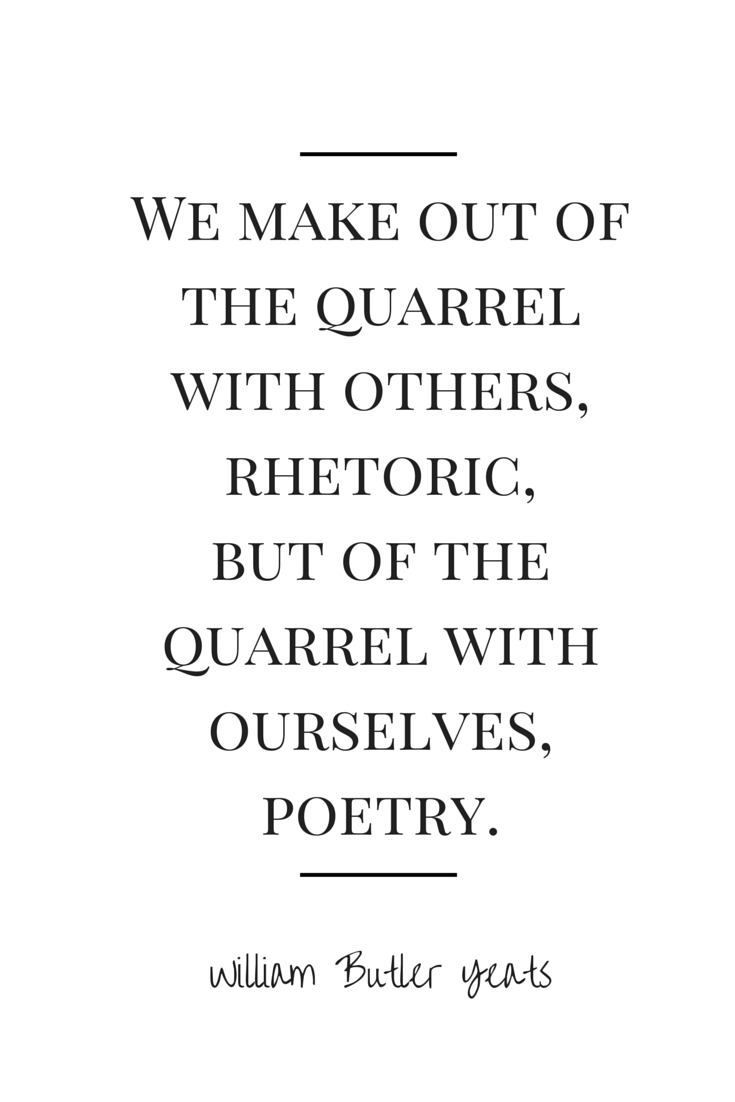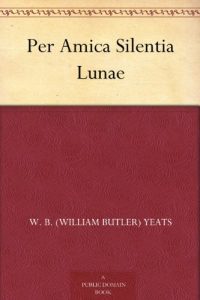
from Anima Hominis (Chap.5)
William Butler Yeats
We make out of the quarrel with others, rhetoric, but of the quarrel with ourselves, poetry. Unlike the rhetoricians, who get a confident voice from remembering the crowd they have won or may win, we sing amid our uncertainty; and, smitten even in the presence of the most high beauty by the knowledge of our solitude, our rhythm shudders. I think, too, that no fine poet, no matter how disordered his life, has ever, even in his mere life, had pleasure for his end. Johnson and Dowson, friends of my youth, were dissipated men, the one a drunkard, the other a drunkard and mad about women, and yet they had the gravity of men who had found life out and were awakening from the dream; and both, one in life and art and one in art and less in life, had a continual preoccupation with religion. Nor has any poet I have read of or heard of or met with been a sentimentalist. The other self, the anti-self or the antithetical self, as one may choose to name it, comes but to those who are no longer deceived, whose passion is reality. The sentimentalists are practical men who believe in money, in position, in a marriage bell, and whose understanding of happiness is to be so busy whether at work or at play, that all is forgotten but the momentary aim. They find their pleasure in a cup that is filled from Lethe’s wharf, and for the awakening, for the vision, for the revelation of reality, tradition offers us a different word—ecstasy. An old artist wrote to me of his wanderings by the quays of New York, and how he found there a woman nursing a sick child, and drew her story from her. She spoke, too, of other children who had died: a long tragic story. “I wanted to paint her,” he wrote, “if I denied myself any of the pain I could not believe in my own ecstasy.” We must not make a false faith by hiding from our thoughts the causes of doubt, for faith is the highest achievement of the human intellect, the only gift man can make to God, and therefore it must be offered in sincerity. Neither must we create, by hiding ugliness, a false beauty as our offering to the world. He only can create the greatest imaginable beauty who has endured all imaginable pangs, for only when we have seen and foreseen what we dread shall we be rewarded by that dazzling unforeseen wing-footed wanderer. We could not find him if he were not in some sense of our being and yet of our being but as water with fire, a noise with silence. He is of all things not impossible the most difficult, for that only which comes easily can never be a portion of our being, “Soon got, soon gone,” as the proverb says. I shall find the dark grow luminous, the void fruitful when I understand I have nothing, that the ringers in the tower have appointed for the hymen of the soul a passing bell.
The last knowledge has often come most quickly to turbulent men, and for a season brought new turbulence. When life puts away her conjuring tricks one by one, those that deceive us longest may well be the wine-cup and the sensual kiss, for our Chambers of Commerce and of Commons have not the divine architecture of the body, nor has their frenzy been ripened by the sun. The poet, because he may not stand within the sacred house but lives amid the whirlwinds that beset its threshold, may find his pardon.


1 thought on “William Butler Yeats on Poetry”
Comments are closed.